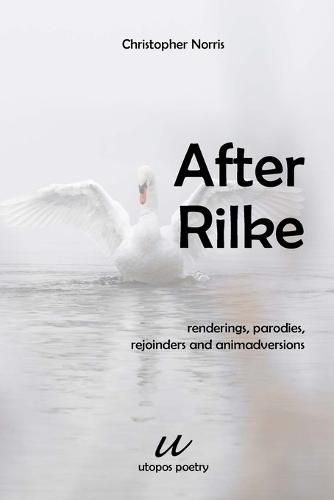Readings Newsletter
Become a Readings Member to make your shopping experience even easier.
Sign in or sign up for free!
You’re not far away from qualifying for FREE standard shipping within Australia
You’ve qualified for FREE standard shipping within Australia
The cart is loading…






This title is printed to order. This book may have been self-published. If so, we cannot guarantee the quality of the content. In the main most books will have gone through the editing process however some may not. We therefore suggest that you be aware of this before ordering this book. If in doubt check either the author or publisher’s details as we are unable to accept any returns unless they are faulty. Please contact us if you have any questions.
In these renderings of a wide selection from Rilke’s New Poems (1907-6) a leading literary theorist and philosopher takes a fresh look at the process, possibilities, and challenges of poetic translation. While honouring Rilke’s singular gifts of inventiveness, depth, acute observation, and narrative power Christopher Norris also finds plentiful room for expanding the scope of translation as an exercise in inter-cultural hermeneutics and critical-creative practice. His versions range over genres or modes from the relatively ‘straight’ to various kinds of self-distancing, ironic, parodic, or downright dissident treatment, thereby combining the activity of translation with those of commentary and critique. At the same time he reflects the poet’s formal priorities by retaining rhyme and meter throughout, as in the original texts, but accepting the need for adjustments from poem to poem so as to accommodate the syntactic and prosodic differences between German and English. Rilke has long been a magnet for English translators of varied persuasion but this volume offers much that is timely and distinctive. Norris’s renderings are notable for their tonal variety, their often witty or irreverent character, their formal dexterity, their range of intertextual reference or allusion, and their constant awareness of reception-history as a changing backdrop to the poetry that often calls for renewed approaches to the task of translation. Any suspicion of wilful tampering or perverse delight in satirically upping the ante is soon dispelled by the many instances where formal resources are deployed in such a way as to capture salient aspects of the original’s meaning, mood, and more elusive nuances. Where these versions depart furthest from traditional practice is in parodying certain questionable aspects of Rilke’s work, among them its sometimes rather vapid spiritualism or mysticism, its attitude toward women and sexual relations, and its blind-spots of snobbery and aristo pretension. Elsewhere the pressure or tension created by Norris’s active engagement is sufficient to break with the ideal, if such it is, of strict line-for-line or stanza-for stanza proportionality and to overrun the original’s length by a factor well beyond normal allowances. Those renderings most often take the form of a dialogue between poet and translator, or a running commentary that functions very much like an interlinear gloss.
$9.00 standard shipping within Australia
FREE standard shipping within Australia for orders over $100.00
Express & International shipping calculated at checkout
This title is printed to order. This book may have been self-published. If so, we cannot guarantee the quality of the content. In the main most books will have gone through the editing process however some may not. We therefore suggest that you be aware of this before ordering this book. If in doubt check either the author or publisher’s details as we are unable to accept any returns unless they are faulty. Please contact us if you have any questions.
In these renderings of a wide selection from Rilke’s New Poems (1907-6) a leading literary theorist and philosopher takes a fresh look at the process, possibilities, and challenges of poetic translation. While honouring Rilke’s singular gifts of inventiveness, depth, acute observation, and narrative power Christopher Norris also finds plentiful room for expanding the scope of translation as an exercise in inter-cultural hermeneutics and critical-creative practice. His versions range over genres or modes from the relatively ‘straight’ to various kinds of self-distancing, ironic, parodic, or downright dissident treatment, thereby combining the activity of translation with those of commentary and critique. At the same time he reflects the poet’s formal priorities by retaining rhyme and meter throughout, as in the original texts, but accepting the need for adjustments from poem to poem so as to accommodate the syntactic and prosodic differences between German and English. Rilke has long been a magnet for English translators of varied persuasion but this volume offers much that is timely and distinctive. Norris’s renderings are notable for their tonal variety, their often witty or irreverent character, their formal dexterity, their range of intertextual reference or allusion, and their constant awareness of reception-history as a changing backdrop to the poetry that often calls for renewed approaches to the task of translation. Any suspicion of wilful tampering or perverse delight in satirically upping the ante is soon dispelled by the many instances where formal resources are deployed in such a way as to capture salient aspects of the original’s meaning, mood, and more elusive nuances. Where these versions depart furthest from traditional practice is in parodying certain questionable aspects of Rilke’s work, among them its sometimes rather vapid spiritualism or mysticism, its attitude toward women and sexual relations, and its blind-spots of snobbery and aristo pretension. Elsewhere the pressure or tension created by Norris’s active engagement is sufficient to break with the ideal, if such it is, of strict line-for-line or stanza-for stanza proportionality and to overrun the original’s length by a factor well beyond normal allowances. Those renderings most often take the form of a dialogue between poet and translator, or a running commentary that functions very much like an interlinear gloss.